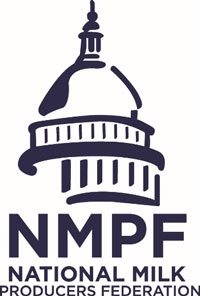
The National Milk Producers Federation today filed a citizen petition with the U.S. Food and Drug Administration, outlining a labeling solution to the use of dairy terms on non-dairy products as the agency considers public input from a recently concluded comment period.
The petition reinforces current FDA labeling regulations, with some additional clarification, to show how marketplace transparency can be enhanced and consumer harm from confusion over nutritional content can be reduced. It also addresses several specious arguments raised by marketers of vegan foods as part of the ongoing debate on dairy labeling, such as the false idea that creating consistent, clear labeling of non-dairy products would somehow limit the use of dairy terms on products that clearly aren’t marketed as dairy substitutes, such as peanut butter. (The petition may be accessed here.)
“The FDA comment docket gave us the chance to explain why there is a compelling need to resolve this labeling issue to address consumer confusion over nutritional content,” said National Milk Producers Federation Executive Vice President Tom Balmer. “This petition lays out a constructive solution to the false and misleading labeling practices existing in the marketplace today, and provides clear, truthful and understandable labeling options for marketers of plant-based imitation dairy products.”
In its petition, NMPF urges FDA Commissioner Scott Gottlieb to “Take prompt enforcement action against misbranded non-dairy foods that substitute for and resemble reference standardized dairy food(s) (e.g., milk, yogurt, cheese, ice cream, butter), yet are nutritionally inferior to such reference standardized dairy foods.” Under existing FDA rules, such foods are required to use the word “imitation” if they reference a standardized dairy food but do not have the same nutritional value. The petition also points to long-standing rules that provide for using the words “substitute” or “alternative” in conjunction with a dairy term when such products are deemed nutritionally equivalent to the dairy products they reference.
“Marketers of plant-based foods that are designed to resemble standardized dairy foods actually have several labeling options under current FDA regulations, as we point out in this petition,” Balmer said. “The unfortunate reality today is that many of them are playing fast and loose with the labeling rules to mask their nutritional inferiority to real dairy products.”
The NMPF petition notes that any manufacturer not wishing to use modifiers such as “imitation,” “substitute” or “alternative” may simply eschew the use of dairy terms altogether – an approach that’s already common in the rest of the world and practiced by some companies in the U.S. including Chobani, Trader Joe’s and Quaker.
NMPF also addresses First Amendment arguments that have been raised by opponents, via a thorough discussion of relevant case law on commercial speech rights. Beginning with the landmark Central Hudson Gas & Electric Corp. v. Public Service Commission and running through more recent decisions such as Zauderer and American Meat Institute vs. USDA, the petition explains how NMPF’s proposed solutions focus on disclosure requirements narrowly tailored to improving labeling transparency and promoting informed consumer choice – and are emphatically not a “ban” on the use of dairy terms by plant-based products.
“Our approach does not advocate for any so-called “bans,” Balmer said. “It simply relies on proper disclosures that allow for appropriate, truthful, non-misleading messaging. In the end, products that are ‘milk-like’ or ‘yogurt-like’ are not actual milk or yogurt – and the nutritional distinctions are critical to informed consumer decision-making. That’s what our petition is all about.”
The National Milk Producers Federation (NMPF), based in Arlington, VA, develops and carries out policies that advance dairy producers and the cooperatives they own. NMPF’s member cooperatives produce the majority of U.S. milk, making NMPF the voice of dairy producers on Capitol Hill and with government agencies. For more, visit www.nmpf.org.


